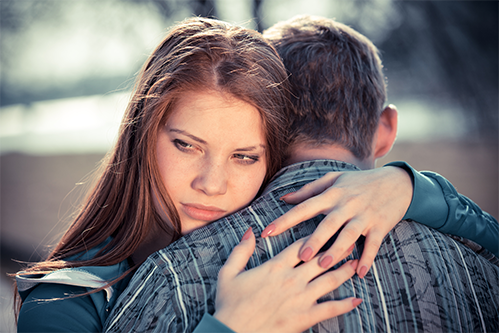
Depression in Loving Relationships
Kathleen Doheny: “The 20-something couple, married just a few years, was eagerly looking forward to the birth of their first baby.
Labor and delivery went fine, and the baby was born healthy. But problems began when the new mom, overwhelmed by motherhood, suffered depression.
“The husband had to take care of everything,” recalls Joan R. Sherman, MFT, a licensed marriage and family therapist in Lancaster, Pa., who saw the couple in counseling. When he was at work, he worried that his wife was so depressed she wasn’t paying needed attention to the baby. He became so worried he secretly set up a “nanny cam.”
She got more and more depressed; he got more anxious, angry, and resentful.
As this case history suggests, depression that affects one partner has an effect on the other partner, the relationship and ultimately the entire family. Nearly 15 million American adults, or about 6.7% of the U.S. population age 18 and older, is affected with a major depression in a given year, according to the National Institute of Mental Health. ( Kathleen Doheny, Depression and Divorce, How does depression affect marriage and relationships?, WebMd)
A Woman’s Story: “My Depression Has Taken Over My Life, Ruining Me And My Marriage. I’ve hit rock bottom. My husband had been trying to get me to see how badly I was slipping for so long, but I always justified the reason I was feeling low and not being an active participant in my own life. My husband told me Sunday that he is filing for divorce and that there’s nothing we can do to save our marriage. Only now that I’ve hit the bottom do I see what he’s been trying to tell me all along. The woman that he married, that he has been trying to save, was beyond saving. I needed to see that the problem was me, that it was bigger than any of the other issues that were enhancing it, and that I could not get past it without help.” (Experience Project, I Battle Depression)
Sari Harrar: “If there’s depression in your marriage, it’s time to act—for your partner and yourself. Waiting increases the chances that your relationship won’t last; depressed couples are nine times more likely to divorce. And trying to fight or make peace with this often misunderstood illness on your own raises risks for both of you. The longer a non-depressed spouse lives with a depressed partner, the higher his or her own risks for depression. The deeper a depressed spouse sinks, the tougher it may be to finally treat the depression—and the greater the risk for alcoholism, drug abuse, violence, and even suicide. The stakes are high, but the odds are that things will improve.
Remember, you’re not alone. An estimated 19 million Americans are currently going through depression. In the Reader’s Digest Marriage in America Survey, 42 percent of respondents named depression as a major challenge in their relationships. It’s not surprising that most said this insidious illness had a negative effect on them. But there was an unexpected ray of hope: One in four said depression had a positive outcome for their marriages. “Getting diagnosed and treated makes all the difference,” says Emily Scott-Lowe, Ph.D, an assistant visiting professor of social work at Pepperdine University, who leads workshops across the country about depression and marriage with her husband, Dennis Lowe, Ph.D, a psychologist and director of Pepperdine’s Center for the Family. “Just 33 percent of people with depression seek and get help. But when you do, your chances for significant improvement are 80 to 90 percent. Almost everyone gets some relief.” (Sari Harrar, health, medicine and science writer, How to Deal with a Depressed Spouse, Reader’s Digest)
Sometimes depression makes it difficult to even leave home to get help. This is where Counseling on Demand comes in.
We are online at CounselingonDemand.com
Effective Online Counseling…Only a Click Away.